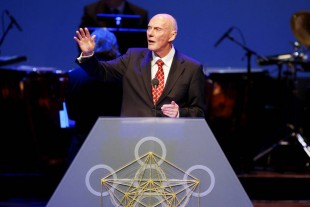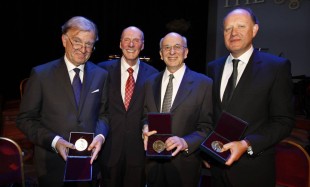
The Kavli Prizes awarded for the first time
The Kavli Prizes were awarded for the first time in Oslo on the 9th of September 2008. His Royal Highness Crown Prince Haakon Magnus led the presentation of the international research prizes to seven of the world’s most prominent scientists in astrophysics, nanoscience and neuroscience. The prize award in each of the scientific areas carries a cash award of 1 million American dollars, donated by Fred Kavli. Each of of laureates also received a gold medal and a scroll.
The Kavli Prize was established as a joint venture between The Kavli Foundation, the Norwegian Ministry of Education and Research and the Norwegian Academy of Science and Letters. In his opening speech the Academy’s president, Ole-Didrik Lærum, emphasised the significance of the prize for increased attention to Norwegian research internationally, and how such a prize breaks down barriers between the traditionally closed scientific community and civil society.
The Kavli Prizes will be awarded every second year, starting i 2008. Their founder is the Norwegian-American businessman and philanthropist Fred Kavli, who was himself present during the ceremony in Oslo Concert Hall.
“We are here today to honor and celebrate our scientists – our prize winners – for their work and their contribution to humanity’s splendid journey,” said Fred Kavli, founder of The Kavli Foundation and Kavli Prizes. “Let these prizes be a token of thanks and gratitude for moving us along the path of greater understanding of the human being, nature, and the universe”, said Fred Kavli in his speech during the ceremony. He explained that he had decided to create his own research foundation, the Kavli Foundation, in 2000 because he wanted to make a contribution to positive human development via scientific research, and in order to create greater public understanding of the importance of research.
Seven Kavli Laureates
His Royal Highness Haakon Magnus presented the prizes, which consist of one million American dollars in each category, a gold medal and a diploma, to the following professors:
- Maarten Schmidt, California Institute of Technology, USA, and Donald Lynden-Bell, University of Cambridge, in the category astrophysics
- Louis E. Brus, Columbia University, USA, and Sumio Iijima, Meijo University, Japan, in the category nanoscience
- Pasko Rakic, Yale University, USA, Thomas Jessell, Columbia University, USA, and Sten Grillner, Karolinska Institutet, Sweden, in the category of neuroscience
A tribute to science
The Master of Ceremonies was the Norwegian artist and former Minister of Culture Åse Kleveland, and the awards were accompanied by an extensive artistic programme. Frode Thingnæs had composed a fanfare for the occasion, “The Kavli Prize Opening”, performed by the Kampen Janitsjar marching band. The Oslo Camerata orchestra tied the musical offerings together, with solo performances from violinists Catharina and Sara Cheng and trumpeter Tine Thing Helseth.The day concluded with the government’s banquet in Oslo City Hall. On Wednesday 10 September the prizewinners will deliver lectures about the scientific work that won them their prizes. This will take place at the University of Oslo, the University of Stavanger and the Norwegian University of Science and Technology (NTNU) in Trondheim. In connection with the Kavli Prizes, Vitenfabrikken (the Science Factory) in Sandnes, near Stavanger, and the NTNU have created comprehensive programmes of lectures and popular-science presentations. In Rogaland the programme will continue Thursday 11 September, while that in Trondheim will not end until Friday 12. September.
